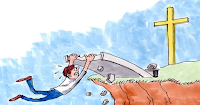Thoughts on life, the universe, and everything, from a fifty-something Canadian goddess....
Friday, December 6, 2024
Wednesday, January 31, 2024
Spiritual Exoskeletons and Endoskeletons - Which One Describes You?
This is part of my "grand unified theory" (ala Malcolm Gladwell) about the development of human spirituality. It is based on the work of Jonathan Heidt, James Fowler, Emanuel Swedenborg, Jean Piaget, and many other thinkers in the world of spirituality. (Yes. I believe that our morality is one face of our spiritual development.) This includes Object Relations theory as well.
James Fowler, author of The Stages of Faith (summarized here, though I believe people stay in the earlier stages of faith far longer than this optimistic projection) has built a model of spiritual development that echoes Jean Piaget's stages of psychological development. A developmental model of spirituality makes immediate sense to me, as we already speak of spiritual "growth." We develop physically, emotionally, psychologically, morally, and in all other ways. Spirituality is developmental too; how could it not be?
The main focus of my interest today is the shift between stage three (Synthetic-Conventional) (exoskeleton) and stage four (Individuative-Reflective) (endoskeleton) according to James Fowler. I know for myself that this shift reached a crisis point in my early forties. It dovetailed with a probable mid-life crisis. My trust in and reliance on my childhood faith had taken too many blows. I was being existentially ejected from (birthed from?) identification with that religious denomination. The process took years and was deeply painful. Another soul who was undergoing a similar birthing likened it to the process of becoming a butterfly after one has been a caterpillar.
"This is where things get crazy and kind of disgusting. The caterpillar does not simply rearrange itself into a butterfly or moth. It takes much more than that. The caterpillar starts to digest itself! That’s right, it releases enzymes that start to liquify almost the entire caterpillar. If you were to cut open a cocoon during this stage, a liquid caterpillar smoothie would ooze out." Mike Szydlowski, The Columbia Tribune, Oct. 2021
 |
| Goo |
"There must be, for Stage 4, a relocation of authority to within the self. While others and their judgments will remain important to the Individuative-Reflective person, their expectations, advice and counsel will be submitted to an internal panel of experts who reserve the right to choose and who are prepared to take responsibility for their choices." James Fowler, Stages of Faith
The shift from three to four can be very painful, especially if one has been in a denomination that requires its members to stay in stage three. Stage three relies on an outside authority. It relies on obedience and compliance within its membership. This outside authority serves as a spiritual exoskeleton to the membership. All of us require this stage as part of our development. It enables us to grow our spiritual core (endoskeleton), the place from which we can discern, sift, and organize our own authentic spirituality.
A Barrier Between Stages Three and Four
All denominations that need stage three adherents see this shift as a threat. Members who question the legitimacy of the teachings and rules threaten the leaders' authority. Eventually, these members vote themselves out of involvement as they realize their inability to change the denomination. Depending on the level of cult dynamics in the denomination, this ejection from the group can be hugely isolating, disillusioning, and painful. One can lose a sense of belonging in an otherwise cohesive and interconnected "family." The leaders generally invalidate the pain of such members and see their departure as "trimming dead wood." (I have heard this spoken explicitly.)
In truth, those who manage to launch from such a denomination are the living wood, and can eventually find root within a group that welcomes stage four spirituality. (I have found a home in a Unitarian Universalist congregation.) But many stay alone and isolated, unwilling to trust again or otherwise unable to find a new spiritual home. They are suffering from spiritual trauma and abandonment.
Exoskeleton
 |
| Endoskeleton |
This shift from an authority-based faith to a living, inwardly reflective faith is part of our healthy spiritual growth. Our spirits call us to grow to this level and beyond. Unfortunately, many religious denominations see this shift as heresy, disobedience, rebellion, and "falling" from grace. These groups tend to punish, shun, vilify, and cast out such members. No wonder it can be hard to leave!
As those of us who have left such groups tend to remain isolated, we can be unaware of the huge and growing body of people on a similar path. If only we had a way to form our own, mutually supportive spiritual communities. Yet we tend to be gun-shy of belonging again.
I believe that authentic, unhampered spiritual growth requires that we make this shift. We are designed to think for ourselves based on years of spiritual work and learning from others. We are built to continue growing spiritually, constantly deepening and adding greater nuance to our understanding. But we also need a spiritual community. Such supportive and non-dictatorial communities exist out there. They are just hard to find. They tend to mind their own business.
Do you rely heavily on outside authorities and some declared text as literally the Word of God? Then you are probably in an exoskeleton stage of spirituality. There is nothing wrong with this stage, but we are meant to evolve beyond it.
Do you think for yourself, incorporating years of experience, thought, and observation into how you understand the human condition and our responsibilities to each other? Then you are probably in an endoskeleton stage of spirituality.
Do you do some of both? Do you feel wobbly and insecure about what to think and whom to trust? Then you are probably in transition.
All of these stages are normal. This model is not to be used to judge others but to assess oneself and understand others.


















